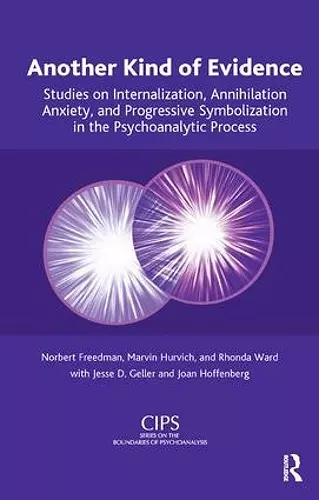Another Kind of Evidence
Studies on Internalization, Annihilation Anxiety, and Progressive Symbolization in the Psychoanalytic Process
Norbert Freedman author Marvin Hurvich author Rhonda Ward author Jesse D Geller author Joan Hoffenberg author
Format:Paperback
Publisher:Taylor & Francis Ltd
Published:31st Dec '11
Currently unavailable, and unfortunately no date known when it will be back
This paperback is available in another edition too:
- Hardback£135.00(9780367107055)

In our current professional climate, with calls for 'evidenced-based treatment', and in light of the prestige accorded to this emblem, we can ask: for what purpose do we seek evidence? For our students? For the public at large? For an inner sense of feeling supported by science? Most disciplines are concerned with cumulative knowledge, aimed toward self-affirmation and self-definition, that is, establishing a sense of legitimacy. The three parts of this volume are directed toward the goal of affirming a public and private sense of the legitimacy of psychoanalysis, thereby shaping professional identity. In each contribution we adhere to the precepts of 'scientific inquiry', with a commitment to affirming or disconfirming clinical propositions, utilizing consensually agreed upon methods of observation, and arriving at inferences that are persuasive and have the potential to move the field forward. Beyond this, each part of this book describes distinct methodologies that generate evidence pertaining to public health policy, the persuasiveness and integrity of our psychoanalytic concepts, and phenomena encountered in daily clinical practice.
'Tragically few contributions to the analytic literature represent truly original work, even fewer are leaps forward in the empirical study of psychoanalytic process. Freedman and his colleagues provide us with a genuinely novel way of examining psychoanalytic concepts, rooted in clinical practice. It is a massive contribution that repays careful study and opens a new vista on psychoanalytic research, retaining the highest standards of empirical and clinical rigor.'- Professor Peter Fonagy, PhD FBA is Freud Memorial Professor of Psychoanalysis and Head of the Research Department of Clinical, Educational and Health Psychology at University College London'Another Kind of Evidence is an important statement of the best sort of psychoanalytic research. The authors combine clinical perspectives and clinical insights, supported by computer-generated empirical documentation. The research presented here is what, in the best of hands, we psychoanalysts can do, and must do in order to maintain ourselves in the world of clinical healing and scientific advance. This book is a strikingly accessible and lucid accounting of the theoretical and empirical psychoanalytical research by Norbert Freedman and his associates at the Institute for Psychoanalytic Training and Research (IPTAR), a New York IPA component society, that really lives up to the "R" in its name. What we discover in reading this work is a compelling description of a research methodology for psychoanalysis and its clinical application. Here is a combination of persuasive clinical observation and generalization (qualitative) and computer-generated documentation which advances knowledge and capability in our field. This book and the research elucidated will resonate helpfully with each of us, clinician and/or researcher.'- Robert S. Wallerstein, MD, Emeritus Professor and former Chair, Department of Psychiatry at the University of California, at San Francisco'Another Kind of Evidence is a most important, excellent contribution to contemporary psychoanalysis in the times of "evidence based medicine". The authors summarize their extensive and intensive research within the IPTAR Program of Research in Psychoanalysis. Their papers aim "toward the goal of affirming a public and private sense of the legitimacy of psychoanalysis, thereby shaping professional identity". The researchers present different and innovative research methods in order to study the outcome, the process, and the micro-world of the therapeutic interactions within psychoanalytic sessions. In each of the three sections of this book, the authors present a new instrument for studying the psychoanalytic process and its outcomes: the Representation of the Therapeutic Dialogue, the Propositional Method, and Sequential Specification. This book is a must for psychoanalysts, psychotherapists and clinical researchers.'- Prof Dr Marianne Leuzinger-Bohleber, Director of the Sigmund-Freud-Institut, Frankfurt A.M. and Professor for Psychoanalytical Psychology, University of Kassel, Germany
ISBN: 9781855758520
Dimensions: unknown
Weight: unknown
380 pages